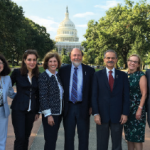A belated Happy New Year to my fellow advocates! Here’s your first update for 2019 on what the rheumatology community should know is going on in Washington, D.C., right now.
Current Climate
On Jan. 3, the 116th Congress gaveled into session with Democrats in control of the House of Representatives and Republicans still the majority in the Senate. Although partisan politics crested again in the longest U.S. government shutdown to date and debate continues over the president’s promise to build a wall, politicians on both sides of the aisle agree the high price of drugs is a problem worth solving. Democratic proposals include addressing problems of price hikes, lack of transparency and rebates to Medicaid—and even consider the government becoming a drug manufacturer. In response, the ACR will reach out to new members of Congress and key committee staff to advocate on your behalf.
The Year Ahead in Advocacy
The main fronts for rheumatology advocacy in 2019 include:
International Pricing Index (IPI) model
This is a big deal. This past fall, the Trump administration released a model to lower drug prices in Medicare Part B and a mandatory demonstration project involving half of Part B drug administration across the country was pending. The model would:
- Use Medicare’s authority to lower drug prices about 30% over five years;
- Remove buy and bill by inserting a vendor between manufacturers and providers; and
- Pay practices a flat fee instead of a percentage of the drug price.
The ACR met with Health and Human Services (HHS) Secretary Alex Azar Jr. in November to convey our concerns about the mandatory nature of any demonstration project. At the end of December, the ACR and many other groups provided detailed comments to the administration. To protect the Part B drug system, which currently offers exceptional access to treatments for many patients, the ACR flatly opposed the mandatory nature of any demonstration project. Because the administration may move forward with a Medicare demonstration project this year, we offered suggestions about how to protect patients’ access to treatments going forward. This kind of constructive feedback was also provided by oncologists, dermatologists and other specialists who will be working together with us. Read the recap of physician responses to the model in a recent article, which states:
“The ACR made a number of recommendations, including make IPI model participation voluntary; allow for an exit for participants if the program is not working for them; provide incentives that could increase gross reimbursement; increase provider reimbursement to cover the expenses associated with dealing with vendors; and make sure the agency is adequately tracking the effect on patient access.”


